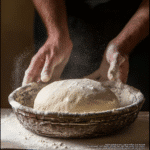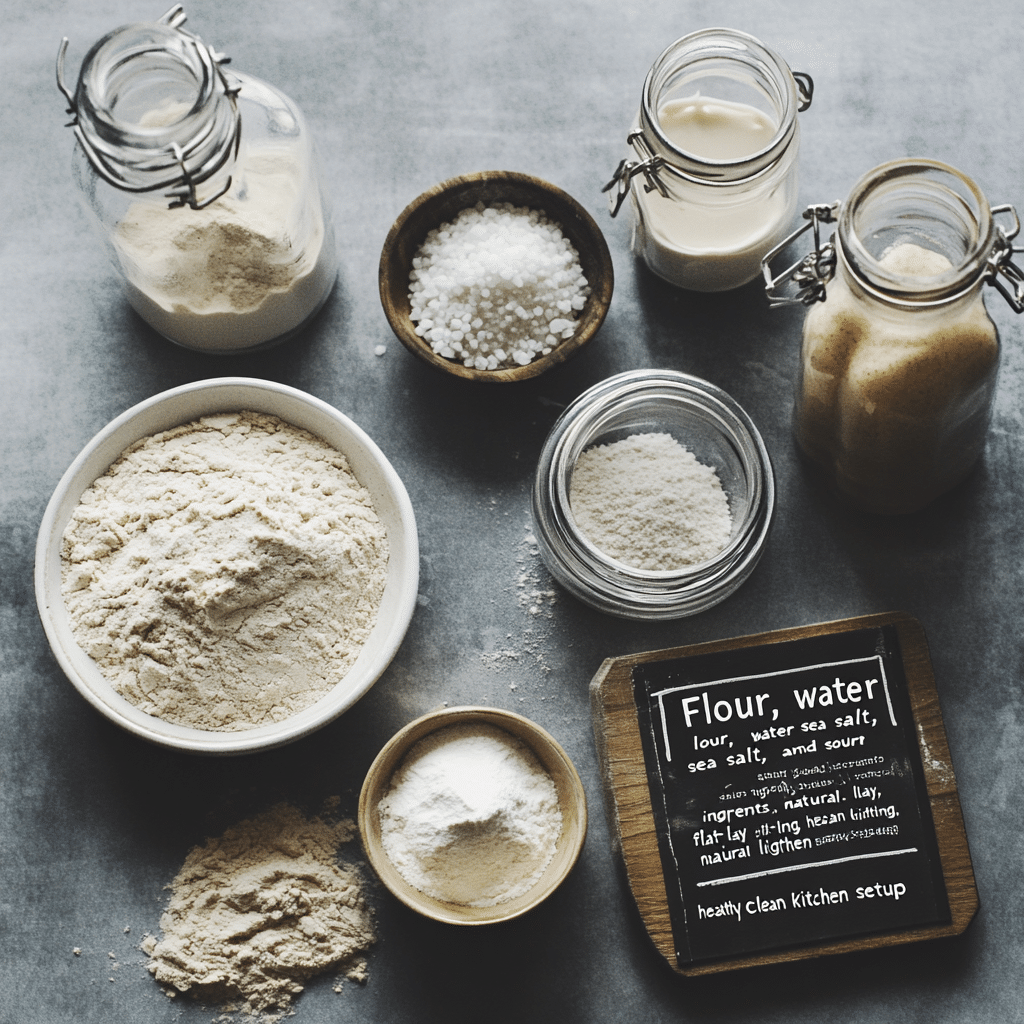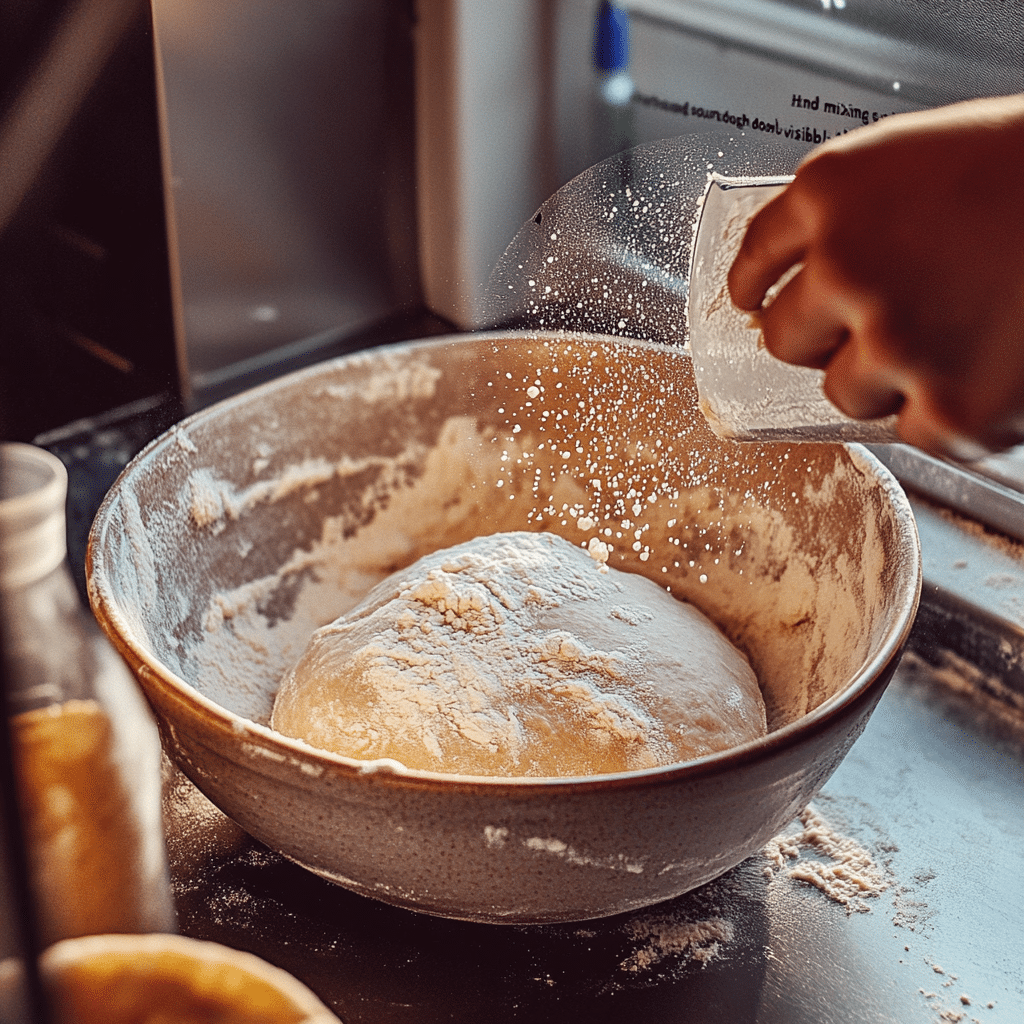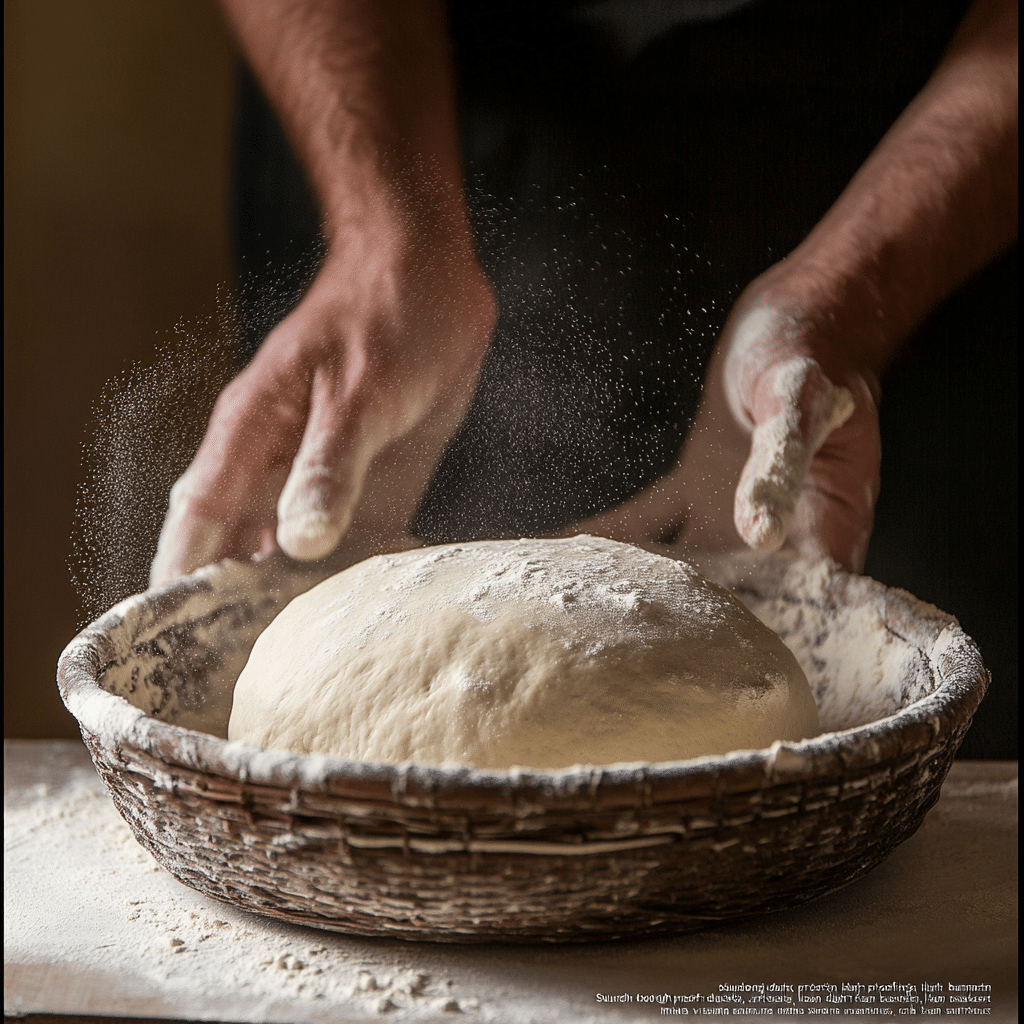Sourdough IBS relief is more than just a trend—it’s becoming a real solution for bread lovers with sensitive stomachs. If you’ve been diagnosed with IBS and bread has become your digestive nemesis, you’re not alone. But there’s a surprising hero rising from the flour-dusted shadows: sourdough. This naturally fermented bread isn’t just flavorful—it may be far easier on your gut.
Thanks to its lower FODMAP content and the magic of wild fermentation, sourdough is gaining attention across the IBS community. In this guide, we’ll break down the science, share personal stories, and offer tips to help you enjoy bread again without the bloat or regret. Let’s explore how sourdough IBS baking can bring comfort back to your plate—one slice at a time.
My Sourdough Story with IBS
How My Gut Found Relief in a Slice
Hi, I’m Marlene Quinn. I’m 43 and bake from my cozy coastal kitchen in Mendocino, California. Most mornings start with the scent of wild yeast and sea air. But before sourdough became my joy, it was part of my struggle with IBS.
Back then, bread was my enemy. Every sandwich left me bloated, gassy, and curled on the couch. Like many dealing with IBS, I thought I had to give up bread completely. But then I stumbled across an article that changed everything—it asked: could sourdough and IBS actually work together?
I had already tried baking a sourdough boule once. It flopped—dense, damp, and inedible. The date I baked it for ghosted me. But something about that failure sparked my curiosity. I dug into the fermentation process and discovered that traditional sourdough might be IBS-friendly thanks to its long fermentation, which reduces FODMAPs, the compounds that often trigger symptoms.
That moment kicked off my obsession. I learned to trust my hands, my eyes, and my gut. Literally. I traveled, baked with barefoot bakers, and watched grandmothers shape dough without a single measuring cup. With each loaf, my symptoms faded. The cramps stopped. My belly felt calm. Sourdough IBS relief wasn’t just a theory—it was my new reality.
Now I run Marlene & Crumb, a small sourdough-focused bakery. Most of our regulars came in worried—afraid of carbs and discomfort. But many, like me, found that the right sourdough made all the difference. If you’ve been told bread and IBS don’t mix, give sourdough a second look. For many, sourdough IBS is a healing match.
What Makes Sourdough Different from Regular Bread?
Unlike most breads you find on grocery shelves, true sourdough is a product of time. Instead of commercial yeast, sourdough relies on wild bacteria and yeast to rise slowly—usually over 12 to 24 hours. This long fermentation helps break down gluten and FODMAPs, especially fructans, which are notorious IBS triggers.
That’s what makes sourdough IBS-friendly for many people. The microbes in the dough partially digest these fermentable carbs before they even reach your gut. What you get is a flavorful loaf that’s gentler on digestion. Not every “sourdough” in stores qualifies, though. Some loaves are sour only in name, rushed through processing and spiked with commercial yeast.
If you’re managing IBS, look for sourdough with just three or four ingredients: flour, water, salt, and starter.
Print
Sourdough IBS Miracle: 5 Powerful Reasons It Calms Your Gut
- Total Time: 14 hours
- Yield: 1 loaf
Description
A slow-fermented sourdough loaf made with just 4 ingredients, specifically designed to be IBS-friendly and easy to digest.
Ingredients
White spelt flour – 500g
Filtered water – 375ml
Sea salt – 10g
Active sourdough starter – 100g
Instructions
1. Mix all ingredients and let rest for 30 minutes (autolyse)
2. Perform 4 stretch-and-folds over 2 hours
3. Let dough bulk ferment for 8–12 hours at room temp
4. Shape dough, place into floured banneton, cover and cold-proof in fridge for 8–12 hours
5. Preheat oven to 475°F, bake in Dutch oven covered for 20 min, then uncovered for 25 min
6. Let cool completely before slicing
Notes
Use white spelt flour for lower FODMAP content
Feed your starter at least 4 hours before mixing
Adjust water based on flour type and humidity
Allow full cooling for maximum digestibility
- Prep Time: 30 minutes
- Cook Time: 45 minutes
- Category: Bread
- Method: Baking
- Cuisine: Gut-Friendly
Nutrition
- Serving Size: 1 slice (1/12 loaf)
- Calories: 180
- Sugar: 0.4g
- Sodium: 190mg
- Fat: 0.8g
- Saturated Fat: 0.2g
- Unsaturated Fat: 0.6g
- Trans Fat: 0g
- Carbohydrates: 37g
- Fiber: 2g
- Protein: 5g
- Cholesterol: 0mg
Keywords: sourdough IBS, low FODMAP sourdough, spelt sourdough bread
Sourdough Bread and IBS Symptoms
Does Sourdough Bread Help with IBS?
Let’s talk about why sourdough IBS might be more than a hopeful pairing—it’s becoming a recommended option for many digestive health professionals. If you’ve been avoiding bread due to IBS symptoms like bloating, gas, or cramps, you’re not alone. These reactions are often caused by FODMAPs, a group of hard-to-digest fermentable carbs.
Traditional sourdough bread—especially when properly fermented over 12 to 24 hours—naturally lowers FODMAP content. The wild yeast and bacteria that fuel sourdough’s rise also break down fructans, a major IBS trigger. This makes sourdough IBS-friendly for many people who struggle with conventional wheat or white bread.
A study referenced by Monash University confirms that longer-fermented sourdough has lower FODMAP levels and may be better tolerated by IBS sufferers. That’s why more dietitians now suggest real sourdough, especially spelt-based varieties, for clients managing sourdough IBS symptoms.
I can personally vouch for the difference. When I swapped out standard loaves for genuine sourdough, the change was immediate. No more post-toast regret. No more bloating. Just calm digestion and full-flavored comfort. And at Marlene & Crumb, our customers echo the same story—sourdough IBS relief that feels like reclaiming bread itself.
Not All Sourdough Is Equal
Before you fill your basket with “sourdough” loaves, beware—not all sourdough is truly sourdough. Many store-bought breads labeled “sourdough” are made with commercial yeast, minimal fermentation, and added sour flavors. These shortcuts don’t reduce FODMAPs and may still flare up sourdough IBS symptoms.
Here’s what to look for:
- Ingredients: Just flour, water, salt, and wild starter—nothing more.
- Fermentation time: Ask your baker. If it rose in just a few hours, skip it.
- Texture and tang: A chewy crust and slight acidity are signs of proper fermentation.
Want total control over what goes in your body? Bake it yourself. At Marlene & Crumb, we teach people to create loaves tailored to sensitive guts. Our sourdough starter, Clementine, thrives in simplicity—just like your gut will when you embrace sourdough IBS solutions at home.

Gut Health Benefits Beyond IBS
Sourdough’s Prebiotic Power
One of the best-kept secrets in sourdough baking? It’s not just about reducing symptoms—it’s about healing. The natural fermentation that makes sourdough IBS-friendly also supports your gut microbiome, which is the foundation of your digestive and immune health.
When you eat traditionally fermented sourdough, you’re consuming more than flour and water. You’re getting lactic acid bacteria, which produce beneficial compounds that support digestion. These friendly microbes help regulate gut pH and enhance the breakdown of nutrients, giving your system a gentle boost.
What’s more, sourdough’s fiber structure—especially in spelt or rye versions—can have prebiotic effects, meaning it helps feed your gut’s good bacteria. This is why many of our bakery guests who struggle with sourdough IBS symptoms report not only less bloating but better bathroom habits, more stable energy, and fewer sugar cravings.
Even folks without diagnosed IBS are turning to sourdough as a way to gently nourish their digestive system. It’s bread as nature intended—minimalist, nutrient-dense, and alive.
Sourdough for IBD and General Inflammation
Now let’s be clear: IBS and IBD are different beasts. IBS is a functional disorder, while IBD (like Crohn’s or ulcerative colitis) involves chronic inflammation and sometimes immune dysfunction. But here’s where sourdough might still shine—its fermentation process reduces triggers that aggravate the gut lining.
For some people with mild IBD, especially in remission, sourdough IBS practices can be adapted to create less inflammatory meals. By lowering gluten and FODMAPs, sourdough becomes easier on the gut’s protective barrier. While sourdough is not a cure, it may reduce flare-ups linked to processed breads or added sugars.
We’ve had customers managing IBD who found traditional sourdough a helpful tool—not just for comfort eating but for sustaining nourishment during remission phases. Always check with your doctor or dietitian, but if inflammation is your concern, choosing naturally fermented foods is a good place to start.
At Marlene & Crumb, we bake with purpose—and passion. For us, sourdough IBS solutions go beyond symptom relief. It’s about reconnecting people with real food that respects their bodies.

How to Choose and Bake IBS-Friendly Sourdough
Tips for Buying or Baking the Right Loaf
Finding the right bread when managing IBS can feel like searching for a unicorn. But with a little know-how, you can spot (or bake) the kind of sourdough that supports—not sabotages—your gut. If you’re serious about eating for sourdough IBS relief, the first rule is this: read every label like your gut depends on it.
Here’s what you want:
- Short ingredient list: Just flour, water, salt, and possibly a starter. If you see yeast, sugar, preservatives, or “dough conditioner,” it’s not the real deal.
- Long fermentation: Ask your baker if the loaf fermented for at least 12 hours. The longer the rise, the more FODMAPs are broken down—making it more IBS-friendly.
- Texture check: A good sourdough has a chewy crust, open crumb, and slight tang. That tang is your gut’s new best friend.
Farmers markets, small bakeries, and even some health food stores carry authentic sourdough. When in doubt, skip the shelf and go homemade. That’s what changed everything for me—and for many of our customers navigating sourdough IBS diets with fresh hope.
A Simple Sourdough Recipe for Sensitive Stomachs
If you’re managing sourdough IBS symptoms, simplicity is your best friend. Here’s a gentle blueprint for a basic sourdough that even first-timers can tackle:
- Flour: Use white spelt or a low-FODMAP blend
- Water: Filtered is best—chlorine can kill your starter
- Starter: Wild sourdough starter, fed and bubbly
- Salt: Just enough to balance flavor
Mix, autolyse, stretch, fold, rest, and bake in a Dutch oven. That’s it. No shortcuts. No rush. The fermentation does the heavy lifting so your gut doesn’t have to.
Every loaf we bake at Marlene & Crumb is shaped with intention—to help people feel nourished, not punished, by food. For those struggling with sourdough IBS choices, homemade baking offers control, clarity, and comfort all in one crusty package.

FAQs About Sourdough and IBS
Is sourdough bread ok for IBS?
Yes, especially when it’s made through a traditional, long fermentation process. True sourdough reduces FODMAPs like fructans, which are common IBS triggers. Many people with sourdough IBS concerns find that sourdough is gentler on their digestion than commercial bread.
Is sourdough bread still inflammatory?
Compared to highly processed breads, authentic sourdough may be less inflammatory due to its simpler ingredients and fermentation benefits. For those managing sourdough IBS symptoms, it often causes fewer flare-ups, though individual responses can vary.
Is sourdough good for gut issues?
Yes, sourdough contains lactic acid bacteria that support a healthy gut microbiome. It also has prebiotic properties that feed beneficial gut flora—helpful for anyone dealing with sourdough IBS or general digestive sensitivity.
Is sourdough better for IBD?
While sourdough is not a treatment for IBD, it may be better tolerated than standard bread. The reduced FODMAPs and simplified gluten structure make it a potential option for IBD sufferers, especially during remission. Always consult your doctor or dietitian before making dietary changes.
Conclusion
If you’ve been living with IBS and feel like bread is a forbidden food, it doesn’t have to be. Sourdough IBS relief is possible when you choose (or bake) the right kind of loaf. Traditional sourdough made with care—not shortcuts—can be a flavorful, healing part of your day. Whether you’re buying from your local baker or experimenting in your own kitchen, give your gut something it can digest, enjoy, and maybe even celebrate.
Bread doesn’t have to be the enemy. With sourdough IBS solutions, it might just become your most comforting ally.

